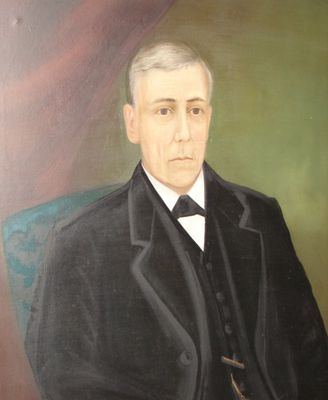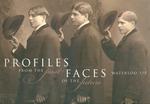David Kuntz
David Kuntz was a pioneer brewer who helped establish Waterloo as a
centre for quality beer making by undertaking every aspect of the
business himself. It is written that Kuntz, a cooper as well as a brewer
from Germany, made the barrels himself, brewed the beer, and actually
made the bricks for the brewery he eventually built.
In the 1830s, Kuntz brewed his beer in an old wooden washtub during the day and made his way around the county at night, selling it from a wheelbarrow. He hid his cash from the beer sales in an empty keg to avoid being robbed.
By the early 1840s, Kuntz had enough capital to purchase a brewery hotel from Christopher Huether. The building still stands at the corner of King and Princess Streets and is now known as the Huether Hotel and Lion Brewery.
The 1861 census shows that Kuntz, aged 41, used 3,000 bushels of barley and 1,000 bushels of hops that year at a value of $1,700. He produced 12,000 gallons of beer, valued at $2,400. The pioneer, who had emigrated from Wiesbaden, Germany, now had two male employees who were each paid a monthly salary of $36. He also had one female employee who was paid $11.50 a month. The enumerator, who recorded the census information, commented that Kuntz made “the best beer in the country as far as the judgment of the Enumerator extends. The Brewery, Cellars, and House are of first quality.”
On a personal note, the census shows he was married to Magdelina, twenty-eight, who was also from Germany. At that time, they had four children – Ludwig, Henry, Catherine and Charles between the ages of two and eight. The couple went on to have thirteen children.
The Kuntz family lived in a two-storey brick house and had two “pleasure carriages,” along with four horses, twelve cows and twelve pigs. The value of the animals was $560.
His new brewery prospered and was called Spring Brewery because it used water from a spring on the property. In the early 1870s, his son Louis took over, renaming it L. Kuntz’s Park Brewery. Louis Kuntz, who was married to Theresa Bauer, died at a young age in the early 1890s, forcing his brothers-in-law Frank and Aloyes Bauer, to take over operations. At the time of his death, his own three sons were still children.
In 1910, Louis Kuntz’s sons were old enough to take over the brewery and David Jr. became president, incorporating the business and calling it Kuntz Brewery Ltd. His brothers William and Herbert were also involved in the business. David Kuntz Sr. had died in 1897.
By the time of the First World War, the Kuntz Brewery was selling 90,000 barrels of beer every year and, in Ontario, was second in popularity only to Toronto’s O’Keefe brew. The Kuntz family also owned hotels including the Alexandra House in Waterloo, and the Opera House in Hamilton.
After years of prohibition, the Kuntz family was dealt a fatal blow when the federal government won a tax suit valued at $200,000. By October, Toronto’s beer magnate E.P. Taylor took control of the million dollar plant for the price of simply paying the suit.
In 1936, Carling Breweries Ltd. of London, Ontario joined Kuntz, calling the business Carling-Kuntz Brewery Ltd. With the outbreak of the Second World War, the name Kuntz was dropped for sounding “too German” along with the well-loved brews Culmbacher, Bohemian and Olde German Lager. In the mid-1970s it became Carling O’Keefe and a few years later the business was sold to Labatt Breweries of London.
The Labatt brewery in Waterloo was demolished in 1993, but the Kuntz beer that started out in an old washtub, will be remembered by some as “the beer that made Waterloo famous.”
Photo courtesy of Bert Kuntz.
David Kuntz (Waterloo 150 Profile)
Description
- Creator
- Gallagher, Beth, Author
- Media Type
- Text
- Image
- Description
- To celebrate Waterloo's 150th anniversary, the Waterloo Public Library published a book called "Profiles from the Past, Faces of the Future." This book featured 150 profiles of people who helped make Waterloo what it is today. This is the digitized profile for David Kuntz.
- Notes
- Please visit the Waterloo Public Library to enquire about physical copies of "Profiles from the Past, Faces of the Future."
The Waterloo 150 project was funded by a grant from the Waterloo Regional Heritage Foundation. Beth Gallagher wrote the profiles with the assistance of many research volunteers. Information for the profiles was gathered from a variety of sources from the community and the Ellis Little Local History Room. Notable sources include the Ellis Little Papers, newspaper clippings, local magazines and books. - Place of Publication
- Waterloo, Ontario
- Date of Publication
- 2007
- Subject(s)
- Personal Name(s)
- Kuntz, David ; Kuntz, Magelina ; Kuntz, Ludwig ; Kuntz, Henry ; Kuntz, Catherine ; Kuntz, Charles ; Kuntz, Louis ; Bauer, Theresa ; Bauer, Aloyes ; Bauer, Frank ; Kuntz, William ; Kuntz, Herbert
- Language of Item
- English
- Geographic Coverage
-
-
Ontario, Canada
Latitude: 43.4668 Longitude: -80.51639
-
- Copyright Statement
- Uses other than research or private study require the permission of the rightsholder(s). Responsibility for obtaining permissions and for any use rests exclusively with the user.
- Contact
- Waterloo Public LibraryEmail:askus@wpl.ca
Website:
Agency street/mail address:35 Albert Street, Waterloo, Ontario, Canada, N2L 5E2
- Full Text




